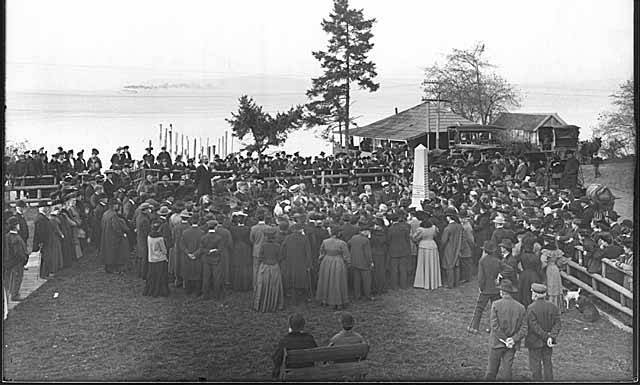Want to start a friendly argument? Insist that some old Puget Sound spellings and pronunciations are correct.
For example, if you called West Seattle “Alkee,” not “Alki,” you would be correct. Another local name, that famous 1851 Euro-American landing spot for the Denny party is properly called “Skwudux.” Within a few weeks, the new settlement with a better beach and profusion of protective cedar trees was moved to “Smaquamox,” a Native American campsite.
“New York” was the first settler name of “Smaquamox” for the Denny, Low, Boren, Terry, and Bell families. John Low and Lee Terry, native New Yorkers, believed that ambitious name would augur a bright future for their little encampment. Later, in jest, the Native word “Alkee,” meaning “bye and bye” or “soon,” was added to “New York.” However, “New York Alkee” was a mouthful and “Alkee” became the name. “Alki Point” remains today, with the great New York of the Pacific Northwest, Seattle, across the bay.
Noah Sealth, or Chief Seattle, has also experienced name problems. Chief of the Duwamish and Suquamish tribes, he was about 65 years old when the Denny party arrived. His age alone would have commanded respect, but apparently he was also tall, had a commanding voice, and may have recognized the technological acumen and authority of the newcomers on his beach. He counseled his people to maintain peace — as long as the newcomers did likewise. Also, gutteral sounds of the Chinook and other local dialects were difficult for the newcomers to pronounce, so “Seattle” replaced “Sealth” and other versions.
The old chief was at first alarmed that his name was used to describe the new settlement. Native superstition held that a person’s spirit would be troubled if his name was used indiscriminately after death.
Another example of disputed local names arises from British Captain George Vancouver naming our gleaming local mountain for his London boss Peter Rainier. British and American chart makers had always used Native names for the Great Peak: “Tahoma,” “Tacobet,” “Tuwouk,” or “Tacoba.” Other fanciful monikers were also used: “Full Breast” or “the Mountain that was God.” In 1899, Congress designated the general area Mount Rainier National Park, but history buffs continued to reclaim the ancient titles.
Lastly, Seattle’s Old Town on Yesler Way was originally called “Pioneer Place.” The surrounding neighborhood, due to an infamous past, was referred to as “The Lava Beds,” “The Tenderloin,” “The Sag,” “Wappyville” (after a former Chief of Police), and of course “Skid Road.”
Today’s Pioneer Square, scene of underground tours, art galleries, and nighttime jazz, is not a square but a triangle. Local historians such as Gordon Newell, Nard Jones, and Murray Morgan wrestled with the anomaly of using “square” instead of “place.” Sad to report, they gave up. Like Alki, Chief Seattle, Mt. Rainier, and Pioneer Square, these are historically wrong designations, but they have stuck.
Discover more from Post Alley
Subscribe to get the latest posts sent to your email.

Great story, Junius. I’m reminded of that small town on the Columbia River, about 60 miles east of Portland / Vancouver, named Bingen. It was settled in the late 1800’s by German immigrants who gave it the same name as the city they had come from on the Rhine River. The name of the town is pronounced BIN-jen, despite the fact that its German namesake is pronounced BING-en.
So enjoyed your article. Former Seattleite who remembers as a youth growing up in eastern Washington a friend’s story who lived in Seattle (1929-1939). She told me one of the reasons Alki’s pronunciation was changed from ‘Alkee’ was that it sounded too much like abbreviation for an alcoholic. Years later, purchased a history book years later written by a school superintendent for students which confirmed this story.
That’s terrific. I love that bit of history.
Thank you.
There are plenty of present day pronunciation cues to help distinguish old timers from latecomers. If someone says “Duh Moynes” instead of the French pronunciation for Des Moines, you can be pretty sure the speaker has been around for a while. Also “Boeing’s”- dead giveaway. Or “Pike’s Market”. “Skid Row”. Over on the Olympic Peninsula when you hear Quilcene spoken as Quil-uh-seen, you know you’re listening to a card-carrying Mossback
I wouldn’t be too sure that it was uniformly pronounced “alkee” and then changed to “alki”. Note that I can’t unambiguously express that in an English language context, because we don’t have uniform spelling conventions, but dictionaries spell it “alki”, alongside “tyee” and “illahee”.
Wonderful article. I too remember when “Boeing’s” was where your mom and dad worked, ditto for buying clothes at Nordstrom’s and Frederick’s. Do people still say “Pill Hill” and “Cap Hill” I wonder? I recall when a Seattleite could privately chuckle (or, publicly rebuke, if they were impolite) newcomers who referred to Pike’s Market. The only change that bothers me is putting an article “the” in front of Puget Sound! It isn’t “The Puget Sound.” I have no idea why that bothers me, it just does.
The author of this article told me in a delightful email that the correct original term is actually “Puget’s Sound” … which pleases me. Maybe an editor at some point thought the possessive apostrophe was a pain, and it became Puget Sound. Thank you for that information.
Thank you, Junius. The history of place names is always fascinating.
Your articles are my reliable Monday ‘de-stress’ reading.
I really enjoy the ‘possessive’ form of place names. Puget’s Sound is a place name I’ll be using here in the south Puget’s Sound.
That’s how I’m spelling it from now on.